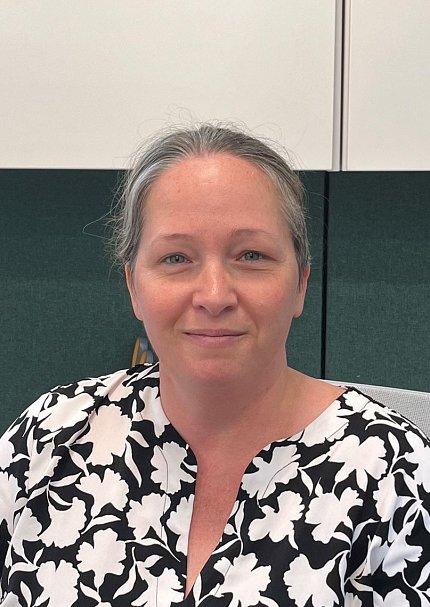Sharing As Caring
Keegan Shares Tips for Combating Anxiety

Everyday life is full of stressors—traffic, looming deadlines, conflicting family schedules. But how do you manage when anxiety creeps into your work life?
Jeanne Keegan, senior project officer in the division of design and construction management in the Office of Research Facilities knows what that’s like. She lives with generalized anxiety disorder (GAD) and is open about sharing her experience and coping strategies. She has been an NIH employee for five years and was a contractor prior to that. Overall, she has been involved in NIH construction projects for 19 years.
“I picked up more work with more responsibilities as my career progressed,” she recalled. “I hit breaking points where I would feel overwhelmed and want to quit.”
In retrospect, she realized she was experiencing burnout, or a state of mental, emotional and often physical exhaustion brought on by prolonged or repeated stress. Thankfully, Keegan had access to a support system that included trusted mentors, doctors and counselors to help her discuss her reasons for wanting to quit.
“It usually wasn’t the job that caused anxiety, but how I handled the things my job threw at me,” she realized.
Over the years, she learned to cope with stress and anxiety. Counseling and medication are helpful for Keegan, as are identifying and avoiding things that trigger her anxiety. Strong scents such as certain perfumes and colognes can trigger migraines and so, as she explained, any strong scent can elicit anxiety because she doesn’t know if it will cause a migraine.
Virtual meetings and hybrid work have been enormously helpful, she said. Having the space on-site to move to a quiet area and having the option to work remotely provide opportunities for people with anxiety disorders to avoid triggering situations. She also prioritizes sleep and exercise, and listens to music and audiobooks to distract from cyclic, anxious thoughts.
Keegan currently has 11 mentees and also has several of her own mentors. She sees mentoring as a productive outlet for her anxiety. “When you take time out of your day to assist someone else, you are taking yourself out of your mental environment to focus on someone else’s needs, which can be both a relief and a morale booster,” she said.
Finally, Keegan encourages an open and accepting environment with the team she manages.
“You need a supervisor who you’re able to talk to,” she found. In her own supervisory role, several team members and mentees have come to her and expressed how Keegan’s vulnerability helped them feel less alone.
Creating that environment amongst colleagues can also benefit the entire team, Keegan concluded. “Sharing helps bring teams closer together.”
